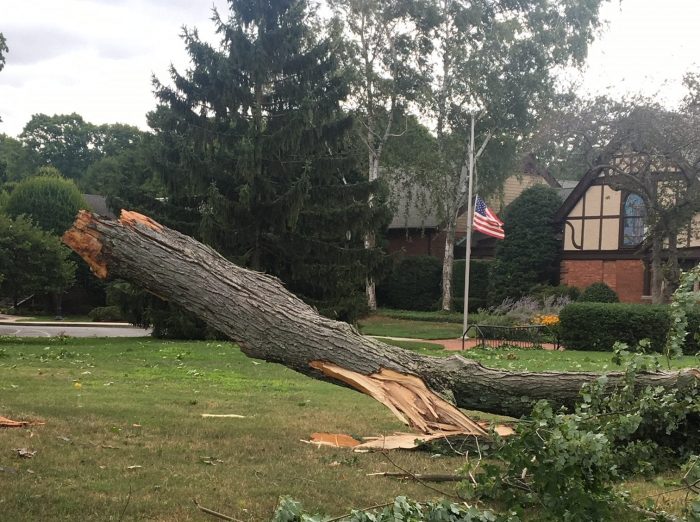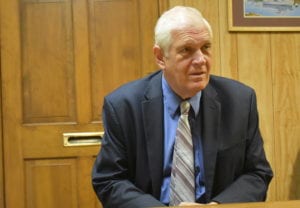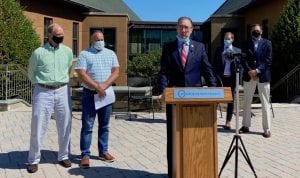Politicians Express Outage Outrage, Demand Improvement from Utilities

Politicians with long memories and short fuses demanded answers from PSEG and LIPA for the communications problems and the slow restoration of power after Tropical Storm Isaias, even as they lamented how this wasn’t supposed to happen again after the long recovery from Superstorm Sandy in 2012.

In a full-day hearing of the combined New York State Assembly and Senate, local politicians including Assemblymen Steve Englebright (D-Setauket) and Doug Smith (R-Holbrook) and Senators James Gaughran (D) and Todd Kaminsky (D-Rockville Center) questioned everyone from the chairman of the Public Service Commission, John Rhodes, to the President of PSEG Long Island, Daniel Eichhorn, and the CEO of LIPA, Thomas Falcone.
“We were told after Superstorm Sandy that things would change, but they did not,” Kaminsky said. “Why do we pay some of the highest electric and internet bills in the country when we couldn’t reach a provider, when the information we got was inaccurate? Why is it so hard to receive a reimbursement? Who is funding those reimbursements?”
Indeed, Rhodes, of the Public Service Commission, said he wanted answers from numerous utilities throughout the state and that the commission was not going to leave “any tool on the table.”
That proved small consolation for politicians and their constituents, some of whom were without power for over a week and many of whom had to throw out the entire contents of their powerless refrigerators and freezers. That is an especially problematic proposition in the aftermath of the pandemic, when budgets are tight and the recession caused by the lockdown has cut jobs in numerous industries.
Englebright questioned why PSEG is reimbursing customers for food spoilage only if their power was out for at least 72 hours. The reimbursed amount totaled $150 if the customers didn’t have receipts and could be as high as $250 if they had receipts, photographs, a canceled check or a credit card bill.
Englebright suggested the timeframe should allow for food spoiled after about 48 hours and wondered why the utilities had not settled on a longer time frame. The Setauket assemblyman wondered whether PSEG believed food “spoils more slowly on Long Island than any other place.”
Eichhorn said the 72 hour threshold defined numerous factors in a storm and “aligns with some of our processes.” The three day time frame “triggers certain things.”
Falcone added that the 72 hours defined a major storm.
“That’s not a health definition,” Englebright countered, but, rather was a “storm definition. That doesn’t necessarily reflect what somebody’s suffering from if their refrigerator is out for perhaps even half of that length of time.”
PSEG’s Eichhorn acknowledged that the company’s response to the storm was “not in line with our expectations.” He said the company is conducting its own reports to figure out what went wrong and to make changes and improvements.
“I’m not here to make excuses,” Eichhorn said. “We own the experience our customers had and we are committed to fixing it.”
Kaminsky asked whether PSEG had tested its system prior to the storm. Eichhorn responded that the company did a simulation in June and that PSEG passed that test.
That passing grade, despite the performance a few months later, will be a focus of PSEG’s own review, as well as a review conducted by LIPA.
“The most relevant stress test was the storm and [the PSEG system] was obviously inadequate,” Falcone said. The systems were “not robust enough” to allow customers to report power failures to PSEG.
On behalf of their constituents, politicians also lamented the shifting timeline for restoring power. In several cases, representatives at the virtual meeting recounted how residents spoke with people in utility trucks or representatives from PSEG who told them their power was on when their constituents were still struggling through the ongoing outage.
In an interview, Gaughran expressed his frustration with the utility arrangement on Long Island, where LIPA oversees PSEG, while the Public Service Commission has no direct authority or recourse.
“The Public Service Commission cannot fine them or sanction them,” Gaughran said. “They’re totally out of the loop.”

Reflecting the concerns of his fellow senators and assemblymen and assemblywomen, Gaughran wondered what the utilities would do to protect Long Islanders in the event that another storm, with potentially stronger winds and heavier rain, impacted the region.
Gaughran said he would like to ensure that PSEG and LIPA don’t tap into a storm reserve fund, which is a collection of money set aside with rate payers money.
“The language in that fund is clear: they can’t access that for any part of the cost” from mismanagement or inadequate storm response, Gaughran said. “If you have an out-of-town crew sitting at the side of the road for hours waiting for instructions … those extra costs are costs of incompetence.”
Gaughran introduced a bill that would give the Public Service Commission the authority to investigate and sanction and fine the company and force them to take corrective action.
To prevent this kind of communication failure from happening again, Eichhorn said the company was conducting reviews of its computer system, which includes its outage management system and the telephone and digital experiences.
“We have made interim changes during and since the storm,” Eichhorn said. “We are continuing to do an after-action review to identify additional short and long term changes to ensure we’re ready for the next storm.”
Falcone added that LIPA would “go back and see why the system failed. We are hiring independent people to redo the stress test.”
Assemblyman Smith asked whether PSEG knew that National Grid employees weren’t a part of the storm response crews, even though people with experience were on Long Island.






